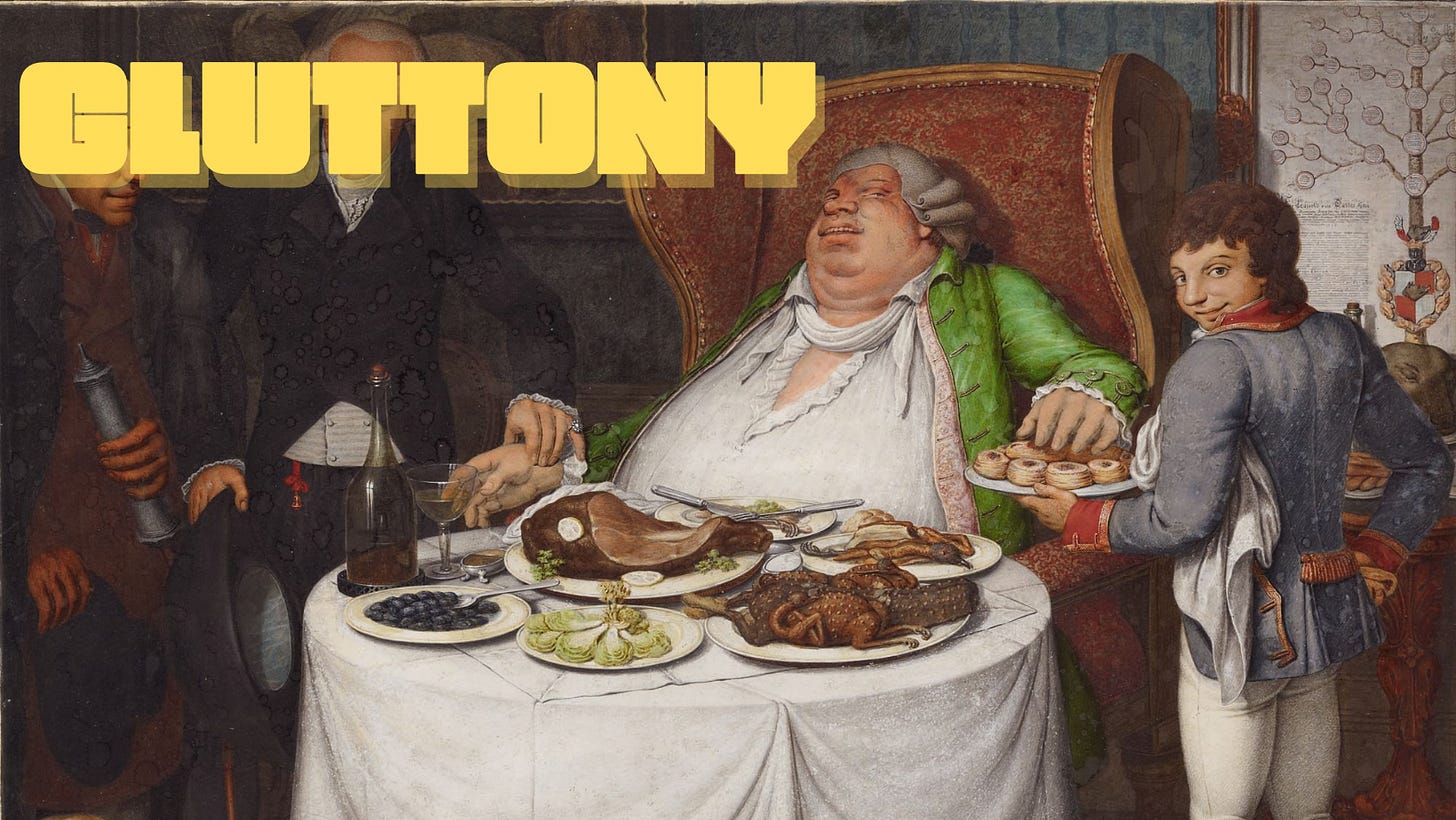The Sin of Gluttony
1 Corinthians 6:19-20 We are a nation of gluttons. It’s not the food’s fault, but our own desire.
Original image - Der Völler by Georg Emmanuel Opiz, via Wikipedia Commons
“Or do you not know that your body is a temple of the Holy Spirit who is in you, whom you have from God, and that you are not your own? For you have been bought with a price: therefore glorify God in your body.”
1 Corinthians 6:19-20 NASB1995
Next in the parade of the seven deadly sins is gluttony, something that most modern Christian denominations don’t consider to be a sin. For the purposes of this devotional, I’m going with the historical view of gluttony as a sin. Gluttony comes from the Latin gula, meaning over-indulgence and over-consumption of food, drink, alcohol, recreational drugs, or wealth items (particular as status symbols).
Let’s take a look at the state of gluttony today in the United States. A lot of Americans are overweight or obese — this information from the National Institutes of Health is eye-opening:
According to 2017–2018 data from the National Health and Nutrition Examination Survey (NHANES)1
Nearly 1 in 3 adults (30.7%) are overweight.
More than 2 in 5 adults (42.4%) have obesity.
About 1 in 11 adults (9.2%) have severe obesity.
Does this mean that most American Christians are sinning as they shovel in Big Macs, gobble gourmet ice creams, and pound down beer and wine? Not necessarily. Many Christian theologians over the history of the church have considered an “excessive desire for food” to be a sin only if causes food to be withheld from the needy.
In the Middle Ages, St. Gregory the Great (AKA Pope Gregory I) outlined five different ways that gluttony could be considered a sin:
1 - Eating before mealtimes in order to satisfy hunger; in other words, snacking between meals.
2 - Seeking delicacies and better quality food to gratify one’s sense of taste. For example, instead of just eating an inexpensive cut of meat, deciding to eat nothing but the most expensive wagyu beef.
3 - Stimulating the palate with overly or elaborately prepared food made with luxurious sauces or seasonings.
4 - Exceeding the necessary quantity of food. As the NIH statistics show above, most of us in America are guilty of this…
5 - Eating with too much eagerness, even when eating the proper amount, and even if the food is not luxurious. In other words, gobbling down a tasteless food truck burrito.
St. Gregory ended his treatise on gluttony by saying that it’s not the food that is the sin, but the irregular desire in terms of how one eats.
A good way for all of us to approach our consumption of food and drink is to consider Paul’s words to the Corinthians in today’s verse. Our bodies are a temple for the Holy Spirit, bought at the cost of Jesus’ death on the cross, and we should glorify God by not overeating and drinking.
That’s more sane advice than these words from Proverbs:
“And put a knife to your throat If you are a man of great appetite.”
Proverbs 23:2 NASB1995
Not everyone who is fat is a glutton. Filling yourself at Thanksgiving dinner doesn’t make you a glutton. Gluttony is basically saying that you can never have enough, whether it’s food, drink, or entertainment that you’re having too much of.
Perhaps it’s time to consider the opposite of gluttony; temperance. That doesn’t mean abstaining totally from something, it just means moderation or voluntary self-restraint. Overindulging in anything isn’t healthy, nor is it good for the soul. Prayerfully consider how you can manage your life through temperance.
Heaven On Wheels Daily Prayer:
Lord, I thank you every day for the food and drink you provide, yet I often enjoy more of your bounty than I should. I realize that I should treat my body — the temple of the Holy Spirit — with more reverence than I do. Please help me each day to temper my appetites with restraint so that I may glorify You through keeping this temple properly maintained. I pray this in the name of Jesus Christ my Savior, AMEN.
https://www.niddk.nih.gov/health-information/health-statistics/overweight-obesity



